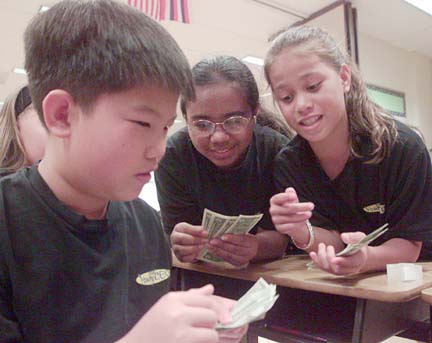


|
"Sole proprietorship," "marketing survey" and "profit" aren't typical vocabulary for fifth- and sixth-graders, but the words fall easily from the tongues of a group of Young CEOs at Waikele Elementary School. Junior CEOs
succeed in WaikeleThe program gives kids
What they learned
tools and skills to reach their
dreams in the business worldBy Lisa Asato
lasato@starbulletin.com"Before I didn't understand what 'tax' meant, too," said Rabeca Bates, 11, explaining the 4-cents-on-a-dollar general excise tax. "That's how the state makes money."
New terms are just part of the Young "Children Embracing Ownership" program that aims to teach kids about business principles. The nonprofit DREAM Team Hawaii Inc., founded by Kevin and Debbie Yoshino, started the program.
"When we started the nonprofit we started giving money away but then we said we need to give our time," said Kevin Yoshino. "Giving them money is like giving them a fish, yeah? Instead we're giving them a fishing pole. We teach them how to fish so when we're gone they can fish tomorrow. They can feed themselves next week."
For 11 weeks, 15 hand-selected students spent Wednesdays after school taking field trips, listening to guest speakers, and learning how to "think like an entrepreneur." They conducted marketing surveys at Waikele Premium Outlets and on campus to decide what people wanted and what products would sell.
"We tried to fill the right need at the right time," said 10-year-old Simen Sam.
The students decided to sell Brainfreeze slushies because of the heat and Coo Coo Candies (a mixture of sour apples, strawberry belts and gummy worms) because "we found in a market survey all the kids like that type of candy," Sam said.
Their on-campus sale sold out in 45 minutes over two days, making $500 profit. The students gave $200 of their earnings to the school and split the rest among themselves.
"We taught the kids to believe in their dreams and follow their dreams and in a sense we had to apply that, too," said Debbie Yoshino, adding that some community leaders had doubts that fifth- and sixth-graders could grasp business concepts.
"Because we teach through games, activities and field trips, they grasped the concepts very quickly, but we ourselves were floored with one of the games we played," she said, explaining: The kids had to decide how much they would charge Gov. Ben Cayetano for land upon which he wanted to build the H-3 freeway. When one student said he would charge $5 for every car that goes across the freeway "it was clear to us that he grasped the concept of residual income."
Vice Principal Dale Castro said the program gave the students a chance to learn economic and business principles and also "taught them about working together, setting goals, planning and the focus ultimately was of stewardship, giving back to the community." He said the $200 gift from the students was a surprise and said the program "shows the beauty of community partnerships."
The Yoshinos are not teachers by profession but are successful entrepreneurs. Together they ran an online networking business Kevin started in 1993.
Kevin Yoshino, a technology project manager at Tesoro Hawaii Corp., said the program also teaches business values such as giving back to others, making short-term sacrifices for long-term gain and being a "servant leader," or leading by helping others. But the most important message he tries to get across to students, he said, is to think "win-win, to be a compassionate entrepreneur."
"That sale day it's a win-win," he said. "The kids made money, the school made money, the school now saw the power of the way we fund raise. They can use that model."
The program sponsors include Tesoro, Waipahu Community Foundation, AIG Hawaii Insurance Co. Inc., Carole Kai Charities Inc., Hawaiian Electric Co. and DREAM Team Hawaii.
The Yoshinos are hoping to expand the program to the middle school and high school levels and are talking with Waipahu Intermediate School about starting a program there in the 2003-2004 school year.
"From a young age, we just want to plant the seeds and some of them are going to sprout, and all it takes is for one Steve Case to sprout and it can impact hundreds of thousands of people all over the world," Kevin Yoshino said.
BACK TO TOP
|
>> Bryceson Iuli, 12: "I thought we would be doing all kind of math, hard math. It was just fun. All we did was talk about our products and then we made it happen." The program, he said, taught him how to be a "successful entrepreneur." And that's important because "it's sort of my fall-back plan, just in case I don't make it in sports." What they learned from
the Young CEOs program>> Jerica Crisostomo: "In the past I thought mistakes you should just give up already, but from this program I learned that mistakes make you stronger."
>> Taryn Alejado: "(I) learned about profit, how the profit was made and most people would like more profit."
>> Shelby Dalton: "I learned how to work with others in harmony, help others."